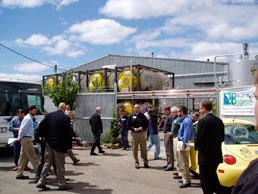SUSTAINABILITY
Community-based is Sustainable
Biodiesel production has grown rapidly worldwide due to the numerous environmental and economic advantages this alternative fuel can have over petroleum. Pacific Biodiesel has been a true pioneer in this burgeoning industry from the very first days of biodiesel production in America, contributing to and applying advances in technology, and observing the creation of various biodiesel business models. The source of the feedstock that is converted into biodiesel is a crucial issue that is garnering increased attention from the global environmental community.
Note that when the environmental, economic and social impacts of producing one gallon of biodiesel versus another are calculated, it is clear that not all biofuels are equal. Not all biofuels are “green” or sustainable. As the industry expands, more information has become available about the triple bottom line effects of different biodiesel production and business models.
With more than a decade of experience, Pacific Biodiesel continues our commitment to our community-based biodiesel model that maximizes the advantages of smaller scale plants utilizing feedstocks grown or collected nearby. A significantly smaller environmental footprint can be obtained by reducing the need for long distance shipping of feedstock to, and product from, a biodiesel refinery. The economic advantages to the community are maximized through local investment and ownership and the creation of jobs, all of which keep profits in the community. Energy dependency is currently one of the major reasons touted for subsidizing biofuels in America, yet the U.S. biodiesel industry still ships much of its fuel across international borders. The community-based model, with the end product used locally, results in ultimate energy security.
Smaller biodiesel plants are much more flexible with the types of feedstocks they can use. Pacific Biodiesel’s multiple feedstock technology creates a high quality, stable fuel supply and enables farmers, renderers and used cooking oil collectors to utilize more of their locally available resources. This flexibility means different types of agricultural feedstocks can be grown in an area, utilizing crop scenarios that may be healthier for the soil; additionally more use can be made of secondary or fallow land, minimizing the displacement of food crops. Smaller scale production also precludes the use of imported oil feedstocks from recently deforested lands, especially former rainforests, which are causing growing concern about the environmental impacts of biodiesel.
Community-based production has helped producers become more resilient in surviving market and price fluctuations as consumers are more likely to support a fuel provider that directly benefits their own community and has strong relationships with area businesses. The concept of community-based production begins to shape and define what is meant by sustainable biodiesel — striving to produce renewable fuel that has a positive environmental, economic and social impact.
Pacific Biodiesel is a strong supporter of environmental groups striving to identify sustainable biofuels production best practices and educate the public.
Speech by Elin Miller, EPA Region 10 Administrator, at the SQPB Grand Opening

